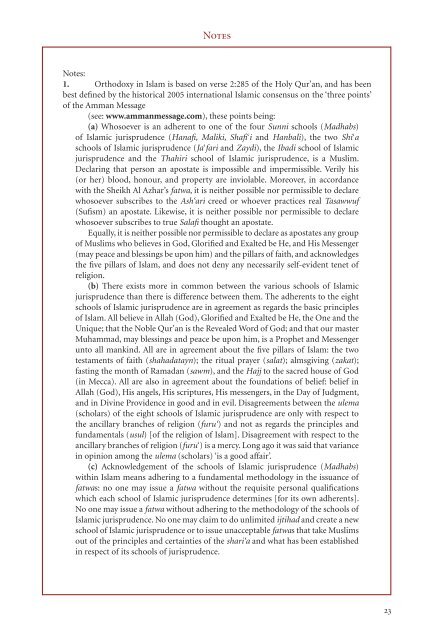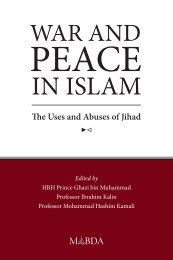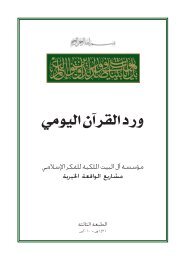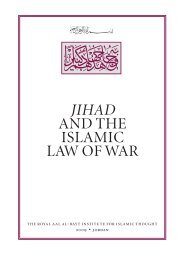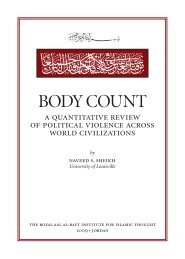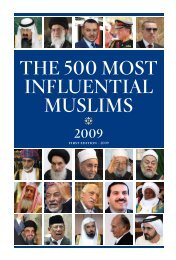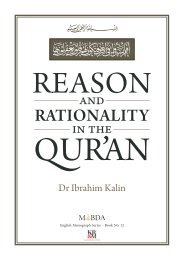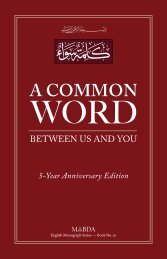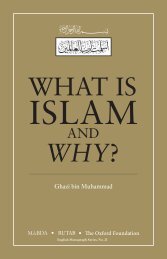01-Contents Page.indd - The Royal Islamic Strategic Studies Centre
01-Contents Page.indd - The Royal Islamic Strategic Studies Centre
01-Contents Page.indd - The Royal Islamic Strategic Studies Centre
Create successful ePaper yourself
Turn your PDF publications into a flip-book with our unique Google optimized e-Paper software.
Notes<br />
Notes:<br />
1. Orthodoxy in Islam is based on verse 2:285 of the Holy Qur’an, and has been<br />
best defined by the historical 2005 international <strong>Islamic</strong> consensus on the ‘three points’<br />
of the Amman Message<br />
(see: www.ammanmessage.com), these points being:<br />
(a) Whosoever is an adherent to one of the four Sunni schools (Madhabs)<br />
of <strong>Islamic</strong> jurisprudence (Hanafi, Maliki, Shafi‘i and Hanbali), the two Shi‘a<br />
schools of <strong>Islamic</strong> jurisprudence (Ja‘fari and Zaydi), the Ibadi school of <strong>Islamic</strong><br />
jurisprudence and the Thahiri school of <strong>Islamic</strong> jurisprudence, is a Muslim.<br />
Declaring that person an apostate is impossible and impermissible. Verily his<br />
(or her) blood, honour, and property are inviolable. Moreover, in accordance<br />
with the Sheikh Al Azhar’s fatwa, it is neither possible nor permissible to declare<br />
whosoever subscribes to the Ash‘ari creed or whoever practices real Tasawwuf<br />
(Sufism) an apostate. Likewise, it is neither possible nor permissible to declare<br />
whosoever subscribes to true Salafi thought an apostate.<br />
Equally, it is neither possible nor permissible to declare as apostates any group<br />
of Muslims who believes in God, Glorified and Exalted be He, and His Messenger<br />
(may peace and blessings be upon him) and the pillars of faith, and acknowledges<br />
the five pillars of Islam, and does not deny any necessarily self-evident tenet of<br />
religion.<br />
(b) <strong>The</strong>re exists more in common between the various schools of <strong>Islamic</strong><br />
jurisprudence than there is difference between them. <strong>The</strong> adherents to the eight<br />
schools of <strong>Islamic</strong> jurisprudence are in agreement as regards the basic principles<br />
of Islam. All believe in Allah (God), Glorified and Exalted be He, the One and the<br />
Unique; that the Noble Qur’an is the Revealed Word of God; and that our master<br />
Muhammad, may blessings and peace be upon him, is a Prophet and Messenger<br />
unto all mankind. All are in agreement about the five pillars of Islam: the two<br />
testaments of faith (shahadatayn); the ritual prayer (salat); almsgiving (zakat);<br />
fasting the month of Ramadan (sawm), and the Hajj to the sacred house of God<br />
(in Mecca). All are also in agreement about the foundations of belief: belief in<br />
Allah (God), His angels, His scriptures, His messengers, in the Day of Judgment,<br />
and in Divine Providence in good and in evil. Disagreements between the ulema<br />
(scholars) of the eight schools of <strong>Islamic</strong> jurisprudence are only with respect to<br />
the ancillary branches of religion (furu‘) and not as regards the principles and<br />
fundamentals (usul) [of the religion of Islam]. Disagreement with respect to the<br />
ancillary branches of religion (furu‘) is a mercy. Long ago it was said that variance<br />
in opinion among the ulema (scholars) ‘is a good affair’.<br />
(c) Acknowledgement of the schools of <strong>Islamic</strong> jurisprudence (Madhabs)<br />
within Islam means adhering to a fundamental methodology in the issuance of<br />
fatwas: no one may issue a fatwa without the requisite personal qualifications<br />
which each school of <strong>Islamic</strong> jurisprudence determines [for its own adherents].<br />
No one may issue a fatwa without adhering to the methodology of the schools of<br />
<strong>Islamic</strong> jurisprudence. No one may claim to do unlimited ijtihad and create a new<br />
school of <strong>Islamic</strong> jurisprudence or to issue unacceptable fatwas that take Muslims<br />
out of the principles and certainties of the shari‘a and what has been established<br />
in respect of its schools of jurisprudence.<br />
23


